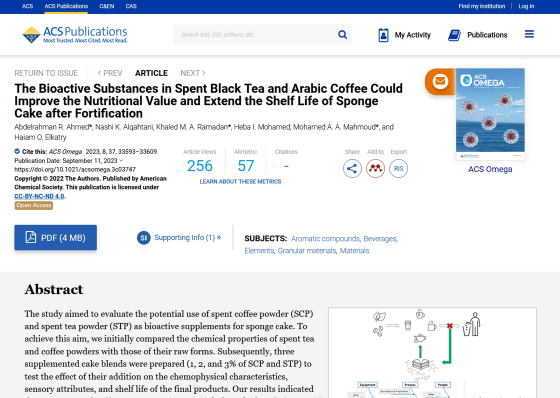Research results show that mixing coffee and tea residue into cake can improve nutritional value and prevent spoilage

Most people who make coffee or tea at home probably throw away the leftovers after brewing as garbage. A new study has announced that mixing coffee and tea leftovers with baked goods such as cakes can improve their nutritional value and extend the shelf life of baked goods.
The Bioactive Substances in Spent Black Tea and Arabic Coffee Could Improve the Nutritional Value and Extend the Shelf Life of Sponge Cake after Fortification | ACS Omega

Something Fascinating Happens When You Put Tea And Coffee Waste in Cakes : ScienceAlert
https://www.sciencealert.com/your-tea-and-coffee-waste-can-make-a-big-difference-in-cakes
Normally, coffee and tea grounds are simply thrown away after brewing, and approximately 90% of them end up in landfills. However, in recent years there has been increasing momentum to reduce waste as much as possible, and research is underway to effectively utilize these leftovers.
For example, in 2023, a study reported that mixing concrete with biochar produced by carbonizing coffee grounds increased the strength of concrete by about 30%.
Coffee grounds improve concrete strength by 30% - GIGAZINE

Additionally, several bioactive compounds in coffee and tea are known to have anti-inflammatory and antioxidant effects, as well as benefits for cognitive performance and the cardiovascular system. Therefore, a research team led by King Faisal University in Saudi Arabia investigated whether mixing leftover coffee or tea residue into baked goods such as cakes could reap the benefits of bioactive substances.
The research team took black tea leaves and Arabica coffee powder purchased from a market in Saudi Arabia, stirred them in boiling distilled water for 10 minutes, washed them with water, dried them in an oven, and ground them into powder. Analysis of these powders revealed that they still contained significant amounts of bioactive substances, including flavonoids .
For example, powdered tea leaves retained up to 73% of theaflavin , an antioxidant that can benefit people with high cholesterol, obesity, and heart disease. In addition, coffee grounds retained up to 64% of 1-caffeoylquinic acid , an antioxidant known to have health benefits.

After that, the research team replaced 1% to 3% of the flour in the cake ingredients with coffee or tea residue and measured the nutritional value of the finished cake. As a result, it was found that cakes mixed with coffee and tea residue had more nutritional components such as calcium, phosphorus, potassium, and magnesium, and were richer in antioxidants than regular cakes.
Furthermore, the amount of bacterial growth in the cake mixed with leftover cake after two weeks of storage was lower than that in the regular cake. The research team believes that the antioxidants in coffee and tea may have inhibited bacterial growth.
The photo below compares the color of cakes mixed with coffee and tea residue. The top 'Control' is a cake using regular flour, and 'C-SCP1', 'C-SCP2' and 'C-SCP3' are mixed with 1%, 2% and 3% coffee residue. The cakes 'C-STP1,' 'C-STP2,' and 'C-STP3' are cakes containing 1%, 2%, and 3% black tea leaves. You can see that the color becomes darker as the content increases.

The research team says, ``Incorporation of used tea leaves or coffee powder into sponge cakes can increase the nutritional value of the cakes and provide additional health benefits to consumers. 'Biologically active substances contribute to potential antioxidant activity and retard microbial growth during storage,' they concluded.

Related Posts:







